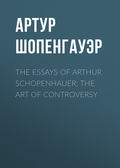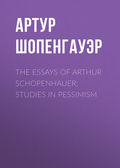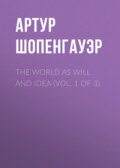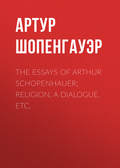
Артур Шопенгауэр
The World as Will and Idea (Vol. 3 of 3)
Chapter XXXVIII.23 On History
In the passage of the first volume referred to below I have fully shown that more is achieved for our knowledge of mankind by poetry than by history, and why this is so; inasmuch as more real instruction was to be expected from the former than from the latter. Aristotle has also confessed this, for he says: “και φιλοσοφωτερον και σπουδαιοτερον ποιησις ἱστοριας εστιν” (et res magis philosophica, et melior poësis est quam historia24), De poët., c. 9. Yet, in order to cause no misunderstanding as to the value of history, I wish here to express my thoughts about it.
In every class and species of things the facts are innumerable, the individuals infinite in number, the variety of their differences unapproachable. At the first glance at them the curious mind becomes giddy; however much it investigates, it sees itself condemned to ignorance. But then comes science: it separates the innumerable multitude, arranges it under generic conceptions, these again under conceptions of species, whereby it opens the path to a knowledge of the general and the particular, which also comprehends the innumerable individuals, for it holds good of all without one being obliged to consider each particular for itself. Thus it promises satisfaction to the investigating mind. Then all sciences place themselves together, and above the real world of individual things, as that which they have divided among them. Over them all, however, moves philosophy, as the most general, and therefore important, rational knowledge, which promises the conclusions for which the others have only prepared the way. History alone cannot properly enter into that series, since it cannot boast of the same advantage as the others, for it lacks the fundamental characteristic of science, the subordination of what is known, instead of which it can only present its co-ordination. Therefore there is no system of history, as there is of every other science. It is therefore certainly rational knowledge, but it is not a science. For it never knows the particular by means of the general, but must comprehend the particular directly, and so, as it were, creeps along the ground of experience; while the true sciences move above it, because they have obtained comprehensive conceptions by means of which they command the particular, and, at least within certain limits, anticipate the possibility of things within their sphere, so that they can be at ease even about what may yet have to come. The sciences, since they are systems of conceptions, speak always of species; history speaks of individuals. It would accordingly be a science of individuals, which is a contradiction. It also follows that the sciences all speak of that which always is as history, on the other hand, of that which is once, and then no more. Since, further, history has to do with the absolutely particular and individuals, which from its nature is inexhaustible, it knows everything only imperfectly and half. Besides, it must also let itself be taught by every new day in its trivial commonplaceness what as yet it did not know at all. If it should be objected that in history also there is subordination of the particular under the general, because the periods, the governments, and other general changes, or political revolutions, in short, all that is given in historical tables, is the general, to which the special subordinates itself, this would rest upon a false comprehension of the conception of the general. For the general in history here referred to is merely subjective, i. e., its generality springs merely from the inadequacy of the individual knowledge of the things, but not objective, i. e., a conception in which the things would actually already be thought together. Even the most general in history is in itself only a particular and individual, a long period of time, or an important event; therefore the special is related to this as the part to the whole, but not as the case to the rule; which, on the contrary, takes place in all the sciences proper because they afford conceptions and not mere facts. On this account in these sciences by a correct knowledge of the general we can determine with certainty the particular that arises. If, for example, I know the laws of the triangle in general, I can then also tell what must be the properties of the triangle laid before me; and what holds good of all mammals, for example, that they have double ventricles of the heart, exactly seven cervical vertebræ, lungs, diaphragm, bladder, five senses, &c., I can also assert of the strange bat which has just been caught, before dissecting it. But not so in history, where the general is no objective general of the conception, but merely a subjective general of my knowledge, which can only be called general inasmuch as it is superficial. Therefore I may always know in general of the Thirty Years' War that it was a religious war, waged in the seventeenth century; but this general knowledge does not make me capable of telling anything more definite about its course. The same opposition is also confirmed by the fact that in the real sciences the special and individual is that which is most certain, because it rests upon immediate apprehension; the general truths, again, are only abstracted from it; therefore something false may be more easily assumed in the latter. But in history, conversely, the most general is the most certain; for example, the periods, the succession of the kings, the revolutions, wars, and treaties of peace; the particulars, again, of the events and their connection is uncertain, and becomes always more so the further one goes into details. Therefore history is the more interesting the more special it is, but the less to be trusted, and approaches then in every respect to the romance. For the rest, what importance is to be attached to the boasted pragmatic teaching of history he will best be able to judge who remembers that sometimes it was only after twenty years that he understood the events of his own life in their true connection, although the data for this were fully before him, so difficult is the combination of the action of the motives under the constant interferences of chance and the concealment of the intentions. Since now history really always has for its object only the particular, the individual fact, and regards this as the exclusively real, it is the direct opposite and counterpart of philosophy, which considers things from the most general point of view, and has intentionally the general as its object, which remains identical in every particular; therefore in the particular philosophy sees only the general, and recognises the change in its manifestation as unessential: φιλοκαθολου γαρ ὁ φιλοσοφος (generalium amator philosophus). While history teaches us that at every time something else has been, philosophy tries to assist us to the insight that at all times exactly the same was, is, and shall be. In truth, the essence of human life, as of nature in general, is given complete in every present time, and therefore only requires depth of comprehension in order to be exhaustively known. But history hopes to make up for depth by length and breadth; for it every present time is only a fragment which must be supplemented by the past, the length of which is, however, infinite, and to which again an infinite future is joined. Upon this rests the opposition between philosophical and historical minds; the former want to go to the bottom, the latter want to go through the whole series. History shows on every side only the same under different forms; but whoever does not come to know this in one or a few will hardly attain to a knowledge of it by going through all the forms. The chapters of the history of nations are at bottom only distinguished by the names and dates; the really essential content is everywhere the same.
Now since the material of art is the Idea, and the material of science the concept, we see both occupied with that which always exists and constantly in the same manner, not something which now is and now is not, now is thus and now otherwise; therefore both have to do with that which Plato set up as the exclusive object of real rational knowledge. The material of history, on the other hand, is the particular in its particularity and contingency, which at one time is, and then for ever is no more, the transient complexities of a human world moved like clouds in the wind, a world which is often entirely transformed by the most trifling accident. From this point of view the material of history appears to us as scarcely a worthy object of the serious and painful consideration of the human mind, the human mind which, just because it is so transitory, ought to choose for its consideration that which passes not away.
Finally, as regards the endeavour – specially introduced by the Hegelian pseudo-philosophy, everywhere so pernicious and stupefying to the mind – to comprehend the history of the world as a planned whole, or, as they call it, “to construe it organically,” a crude and positive realism lies at its foundation, which takes the phenomenon for the inner being of the world, and imagines that this phenomenon, its forms and events, are the chief concern; in which it is secretly supported by certain mythological notions which it tacitly assumes: otherwise one might ask for what spectators such a comedy was really produced. For, since only the individual, and not the human race, has actual, immediate unity of consciousness, the unity of the course of life of the race is a mere fiction. Besides, as in nature only the species are real, and the genera are mere abstractions, so in the human race only the individuals and their course of life are real, the peoples and their lives mere abstractions. Finally, constructive histories, guided by a positive optimism, always ultimately end in a comfortable, rich, fat State, with a well-regulated constitution, good justice and police, useful arts and industries, and, at the most, in intellectual perfection; for this, in fact, is alone possible, since what is moral remains essentially unaltered. But it is the moral element which, according to the testimony of our inmost consciousness, is the whole concern: and this lies only in the individual as the tendency of his will. In truth, only the life of each individual has unity, connection, and true significance: it is to be regarded as an instruction, and the meaning of it is moral. Only the incidents of our inner life, since they concern the will, have true reality, and are actual events; because the will alone is the thing in itself. In every microcosm lies the whole macrocosm, and the latter contains nothing more than the former. Multiplicity is phenomenal, and external events are mere configurations of the phenomenal world, and have therefore directly neither reality nor significance, but only indirectly through their relation to the wills of the individuals. The endeavour to explain and interpret them directly is accordingly like the endeavour to see in the forms of the clouds groups of men and animals. What history narrates is in fact only the long, heavy, and confused dream of humanity.
The Hegelians, who regard the philosophy of history as indeed the chief end of all philosophy, are to be referred to Plato, who unweariedly repeats that the object of philosophy is that which is unchangeable and always remains, not that which now is thus and now otherwise. All those who set up such constructions of the course of the world, or, as they call it, of history, have failed to grasp the principal truth of all philosophy, that what is is at all times the same, all becoming and arising are only seeming; the Ideas alone are permanent; time ideal. This is what Plato holds, this is what Kant holds. One ought therefore to seek to understand what exists, what really is, to-day and always, i. e., to know the Ideas (in Plato's sense). Fools, on the contrary, imagine that something must first become and happen. Therefore they concede to history the chief place in their philosophy, and construct it according to a preconceived plan of the world, according to which everything is ordered for the best, which is then supposed finaliter to appear, and will be a glorious thing. Accordingly they take the world as perfectly real, and place the end of it in the poor earthly happiness, which, however much it may be fostered by men and favoured by fate, is a hollow, deceptive, decaying, and sad thing, out of which neither constitutions and legal systems nor steam-engines and telegraphs can ever make anything that is essentially better. The said philosophers and glorifiers of history are accordingly simple realists, and also optimists and eudæmonists, consequently dull fellows and incarnate philistines; and besides are really bad Christians, for the true spirit and kernel of Christianity, as also of Brahmanism and Buddhism, is the knowledge of the vanity of earthly happiness, the complete contempt for it, and the turning away from it to an existence of another, nay, an opposite, kind. This, I say, is the spirit and end of Christianity, the true “humour of the matter;” and not, as they imagine, monotheism; therefore even atheistic Buddhism is far more closely related to Christianity than optimistic Judaism or its variety Islamism.
A true philosophy of history ought not therefore to consider, as all these do, what (to use Plato's language) always becomes and never is, and hold this to be the true nature of things; but it ought to fix its attention upon that which always is and never becomes nor passes away. Thus it does not consist in raising the temporal ends of men to eternal and absolute ends, and then with art and imagination constructing their progress through all complications; but in the insight that not only in its development, but in its very nature, history is mendacious; for, speaking of mere individuals and particular events, it pretends always to relate something different, while from beginning to end it repeats always the same thing under different names and in a different dress. The true philosophy of history consists in the insight that in all these endless changes and their confusion we have always before us only the same, even, unchanging nature, which to-day acts in the same way as yesterday and always; thus it ought to recognise the identical in all events, of ancient as of modern times, of the east as of the west; and, in spite of all difference of the special circumstances, of the costume and the customs, to see everywhere the same humanity. This identical element which is permanent through all change consists in the fundamental qualities of the human heart and head – many bad, few good. The motto of history in general should run: Eadem, sed aliter. If one has read Herodotus, then in a philosophical regard one has already studied history enough. For everything is already there that makes up the subsequent history of the world: the efforts, action, sufferings, and fate of the human race as it proceeds from the qualities we have referred to, and the physical earthly lot.
If in what has been said we have recognised that history, regarded as a means for the knowledge of the nature of man, is inferior to poetry; then, that it is not in the proper sense a science; finally, that the endeavour to construct it as a whole with beginning, middle, and end, together with a significant connection, is vain, and based upon misunderstanding: it would look as if we wished to deny it all value if we did not show in what its value consists. Really, however, there remains for it, after this conquest by art and rejection by science, a quite special province, different from both, in which it exists most honourably.
What reason is to the individual that is history to the human race. By virtue of reason, man is not, like the brute, limited to the narrow, perceptible present, but also knows the incomparably more extended past, with which it is linked, and out of which it has proceeded; and only thus has he a proper understanding of the present itself, and can even draw inferences as to the future. The brute, on the other hand, whose knowledge, devoid of reflection, is on this account limited to the present, even when it is tamed, moves about among men ignorant, dull, stupid, helpless, and dependent. Analogous to this is the nation that does not know its own history, is limited to the present of the now living generation, and therefore does not understand itself and its own present, because it cannot connect it with a past, and explain it from this; still less can it anticipate the future. Only through history does a nation become completely conscious of itself. Accordingly history is to be regarded as the rational consciousness of the human race, and is to the race what the reflected and connected consciousness is to the individual who is conditioned by reason, a consciousness through the want of which the brute is confined to the narrow, perceptible present. Therefore every gap in history is like a gap in the recollective self-consciousness of a man; and in the presence of a monument of ancient times which has outlived the knowledge of itself, as, for example, the Pyramids, or temples and palaces in Yucatan, we stand as senseless and stupid as the brute in the presence of the action of man, in which it is implicated in his service; or as a man before something written in an old cipher of his own, the key to which he has forgotten; nay, like a somnambulist who finds before him in the morning what he has done in his sleep. In this sense, then, history is to be regarded as the reason, or the reflected consciousness, of the human race, and takes the place of an immediate self-consciousness common to the whole race, so that only by virtue of it does the human race come to be a whole, come to be a humanity. This is the true value of history, and accordingly the universal and predominating interest in it depends principally upon the fact that it is a personal concern of the human race. Now, what language is for the reason of individuals, as an indispensable condition of its use, writing is for the reason of the whole race here pointed out; for only with this does its real existence begin, as that of the individual reason begins first with language. Writing serves to restore unity to the consciousness of the human race, which is constantly interrupted by death, and therefore fragmentary; so that the thought which has arisen in the ancestor is thought out by his remote descendant; it finds a remedy for the breaking up of the human race and its consciousness into an innumerable number of ephemeral individuals, and so bids defiance to the ever hurrying time, in whose hand goes forgetfulness. As an attempt to accomplish this we must regard not only written, but also stone monuments, which in part are older than the former. For who will believe that those who, at incalculable cost, set in action the human powers of many thousands for many years in order to construct the pyramids, monoliths, rock tombs, obelisks, temples, and palaces which have already existed for thousands of years, could have had in view the short span of their own life, too short to let them see the finishing of the construction, or even the ostensible end which the ignorance of the many required them to allege? Clearly their real end was to speak to their latest descendants, to put themselves in connection with these, and so to establish the unity of the consciousness of humanity. The buildings of the Hindus, the Egyptians, even the Greeks and Romans, were calculated to last several thousand years, because through higher culture their horizon was a wider one; while the buildings of the Middle Ages and of modern times have only been intended, at the most, to last a few centuries; which, however, is also due to the fact that men trusted more to writing after its use had become general, and still more since from its womb was born the art of printing. Yet even in the buildings of more recent times we see the desire to speak to posterity; and, therefore, it is shameful if they are destroyed or disfigured in order to serve low utilitarian ends. Written monuments have less to fear from the elements, but more to fear from barbarians, than stone ones; they accomplish far more. The Egyptians wished to combine the two, for they covered their stone monuments with hieroglyphics, nay, they added paintings in case the hieroglyphics should no longer be understood.







